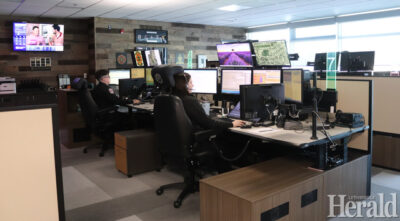Public safety comms perform a vital role
By Alejandra Pulido-Guzman - Lethbridge Herald on April 15, 2025.
 Herald photo by Alejandra Pulido-Guzman
Dispatchers work at their stations Monday as Emergency Communications Officers are being recognized this week during National Public Safety Telecommunicators Week.
Herald photo by Alejandra Pulido-Guzman
Dispatchers work at their stations Monday as Emergency Communications Officers are being recognized this week during National Public Safety Telecommunicators Week.LETHBRIDGE HERALDapulido@lethbridgeherald.com
This week marks National Public Safety Telecommunications week, celebrated across Canada and United States to celebrate all the individuals involved in public safety telecommunications.
Joel McDonald, deputy chief of Public Safety Communications Centre operations, says it celebrates everyone involved in the process, not only 9-1-1 call takers and dispatchers, but also those who support them such IT workers, which includes telephone and radio experts.
“But most importantly our dedicated staff that work 24 hours a day, 365 days a year, to be here to answer that call for service from the public and get their emergency response rolling as fast as possible,” says McDonald.
He adds that the 9-1-1 centre here in Lethbridge is a vital piece of infrastructure for the city and surrounding communities.
“We serve 23 different fire agencies, as well as the Lethbridge Police Service, with a total population of approximately 160,000 people who use our services with our contracted 9-1-1 delivery.”
McDonald says they process about 160,000 events a year and the Public Safety Communications Centre (PSCC), and are a vital link for both 9-1-1 and the non-emergency complaints lines.
“We do answer the police non-emergency complaints line as well as 9-1-1, so any time a citizen needs help from Police, Fire or EMS we are here to support them.”
In 2024 the PSCC received approximately 60,000 9-1-1 calls, along with multiple calls for non-emergency police complaints, and non-emergency complaint calls for open fire burns.
“On average we are taking 4,000 calls a month for 9-1-1 and the big challenge is the abandoned calls and pocket dials,” says McDonald. “Technology has changed the way our people have to adapt.”
He says it’s not just taking calls these days; it’s also using technology to figure out where people are, whether is using GPS location, a smart phone or a smart watch.
“It could be anything that is connected to the internet now can connect with 9-1-1 emergency services in different ways, so we’re constantly adapting, constantly learning, embracing new technology and our staff are constantly evolving to make sure we can continue to find quick and efficient ways to deliver emergency services to the public when they need it the most.”
When talking about how PSCC staff are able to handle calls for the various locations where callers are contacting them from, McDonald says that most of the staff that works there come from the communities they serve such as Raymond, Magrath, Cardston, Medicine Hat and Lethbridge.
“We serve the communities that we live in, and although not everyone is familiar with those areas, we do a lot of training that involves going out on ride-along, meeting our rural fire agencies, doing familiarization with the neighbourhoods and communities, and traveling around as part of our recruiting and training process, to make sure that we know inside and out where our people are calling from.”
When it comes to those serving the community in such crucial roles as 9-1-1 call takers and dispatchers, McDonald says they go through a very difficult and strict hiring process.
“That involves the exact same clearance that the police go through,” he points out. “We require not only the basic typing test and understanding of technology, but there are moral and ethical background checks, and security clearances.”
It takes a very specific type of person to work in the field of emergency communications, and that’s what makes the people who do it worthy of this celebration.
Due to the nature of the calls dispatchers receive on a regular basis, McDonald says the department has done an excellent job in providing them with resources to support their mental health.
“We have a health and wellness coordinator, and we have psychological services available. Right from the day that they are hired, we start working on building up their mental health and resiliency, and providing ongoing support throughout their entire career, so that is there whenever they may need it.”
Because 9-1-1 is such a vital resource for the community, it always has to be available to those that need it, so to make sure there is no disruption to service, McDonald says in Lethbridge they operate a fully redundant centre.
“If anything, ever happens to this location, we do have systems and methods in place to make sure that all of our systems and technology are fully redundant, so our staff can quickly and easily continue operations seamlessly to the public, without any interruption or minimal interruption at best,” says McDonald.
He adds that the 9-1-1 system in Alberta is also designed so that, if one centre is overwhelmed with calls, calls will back up to other centres so they can support each other.
The PSCC recently received international recognition for its work. It was re-accredited as a Fire Accredited Centre of Excellence (ACE) by the International Academies of Emergency Dispatch (IAED). LFES remains the 63rd Fire ACE in the world, a sign that the centre meets the highest standards for emergency fire dispatch.
“Our team is exceptional,” says Jodi Realini, PSCC Quality Assurance Supervisor. “This re-accreditation reflects their commitment to excellence and the community’s trust in them.”
During National Public Safety Telecommunicators Week, LFES invites residents to thank the 9-1-1 professionals who are always ready to answer the call when it matters most. Residents can post on social media or send an email to firedepartment@lethbridge.ca
26-25




